
I s’pose there’s only one time I had the shit creeped outta me.
Granddad was in a nursing home and one night we got the call that he was on the way out. I went with dad and sat in a room as death came to play. Granddad was wired, unaware of his family alongside and instead fixed on something at the foot of the bed.
I mean, whatever it was, he could see it.
It didn’t matter how much my distraught, helpless dad tried to calm him; granddad just kept staring at this invisible entity.
Then he began mumbling. We strained to listen, the words mangled in his cracked throat, and slowly we understood he was talking to his long dead wife.
“Elsie… Elsie… I’m coming to you…”
Well, the hairs on the back of my neck stood up. Hands down, it was a seriously fucked-up few minutes, so much so that I told dad I was leaving. He nodded and returned to the thankless task of trying to get his rapidly expiring father to concentrate on Earthly connections, even if only for a moment or two.
The next morning, I got up to find dad numbly doing the washing-up while staring out the kitchen window. Granddad had died not long after I’d skedaddled. Amid a minor pang of guilt, I started trying to process what I’d witnessed. Now I don’t believe in fairy tales like life after death, heaven and hell, and all that other absurdity that’s been designed to provide the intellectually feeble with an ego-boosting alternative to the concept of nothingness. I’m afraid I have a rather unsentimental take on things: just like a cockroach, you die and that’s the end of it. Cockroaches don’t have an afterlife and neither do you.
But if that’s the case, then what the fuck happened in that stuffy nursing home room?
Bit by bit, I came up with an explanation. Granddad’s body was shutting down after ninety odd years. His brain was going haywire. Deeply embedded images and memories were in all likelihood being dredged up and replayed, fooling his eyes into believing they were reality.
Dying, after all, must scramble your senses.
Of course, if you are a religious or spiritual type, you can still reject such a rationalization. You can still believe my granddad is once again with his wife, busy ignoring her to gamble on the horses and smoke just like he did for most of their marriage. Whatever the case, I’m at peace with accounting for his frantic final few minutes.
Then again, I haven’t forgotten that creepy shit and in a strange way I treasure it. Indeed, sometimes I wish it would come back. To be that close to death, to be peering into that twilight between this world and the possibility of the next. Shit, is this why I love horror movies?
So many, of course, concentrate on gore, violence and that modern curse, the jump cut. Fair enough, but conjuring up eeriness takes a lot more skill, often depending on mood, lighting, characterization, understated dialogue, nuance and camera angles. Now don’t go thinking I’m gonna say the following flicks evoke the same sort of granddad-perishing strangeness I once experienced. Please don’t think I’m that trite. However, I will say these movies are best watched on your own in an unfamiliar, darkened room with volleys of rain pellets occasionally rattling the windows.
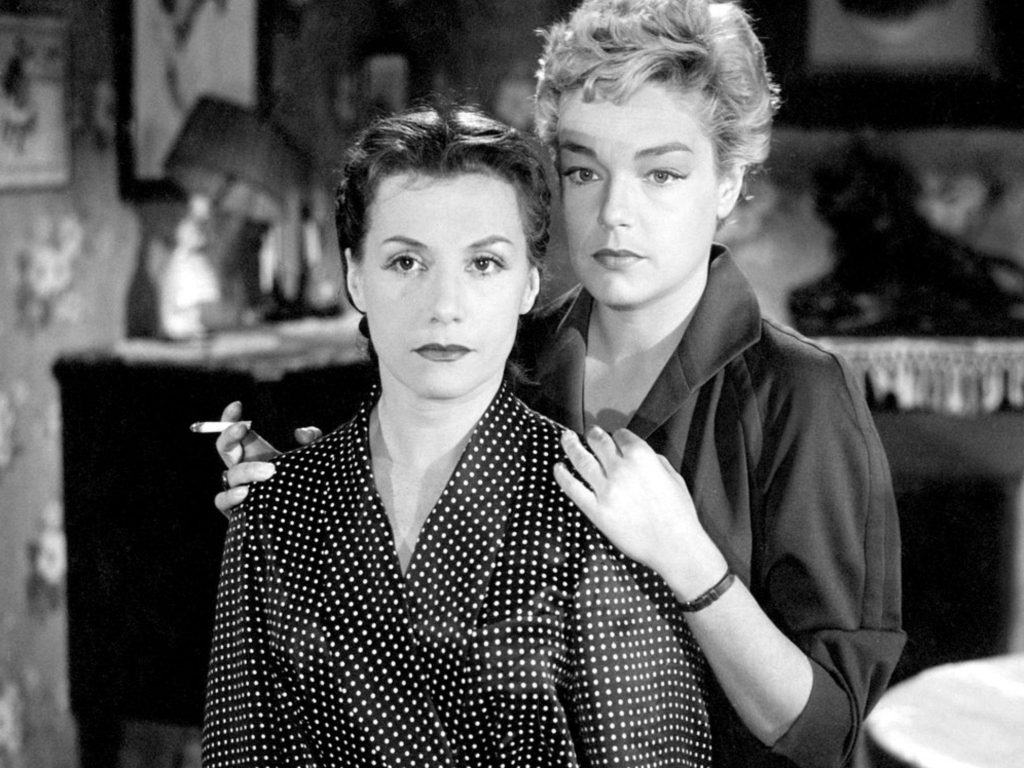
Les Diaboliques (1955)
“What we need to be is very calm,” one female teacher says while gripping her colleague’s shoulders at a rundown Parisian boarding school. “Calm and coldblooded.”
Cripes, what are they planning?
Murder, as it happens. Murder of an abusive, philandering headmaster who happens to be both husband and lover to the two Machiavellian femmes. “Kindness is a waste of time to you,” he says to his divorce-demanding wife, underlining his point by doling out a couple of backhanders. This man is such a pig he even serves rotten food to the school kids to save a bit of cash.
Hmm, guess doing away with him is all right, then.
Now they say the road to hell is paved with the best intentions, but I reckon most of it must be paved with the worst intentions. And this possibility of eternal damnation is a very real one for the delicate Catholic, Christina (Vera Clouzot). Will she go through with the diabolical plan?
The creepiness of the celebrated and influential Les Diaboliques doesn’t kick in until the last ten minutes, but it’s worth the wait. Indeed, it leads to one of the all-time great endings before immediately fumbling it.
Oh, well.
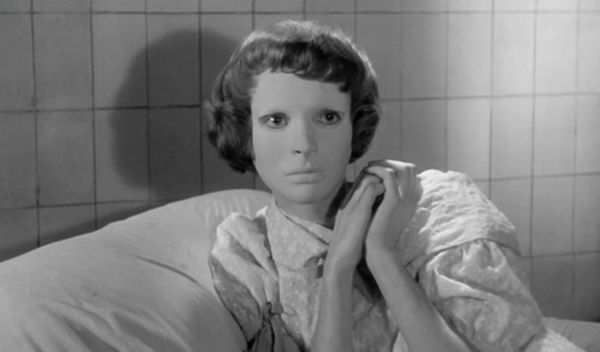
Eyes without a Face AKA The Horror Chamber of Dr. Faustus (1960)
“I’ll succeed,” a renowned Parisian doctor tenderly tells his mask-clad daughter. “I promise you.”
But at what?
We already know big trouble’s afoot as the opening of this black and white classic has shown a corpse being dumped into a river. Then the obviously preoccupied doctor delivers a lecture on the latest development in skin grafts before popping off to the morgue to identify his missing daughter’s remains.
But, hang on, if that corpse fished out of the Seine really is his daughter, who’s the chick he’s making promises to?
It’s clear there’s something not quite right about this Dr. Genessier (Pierre Brasseur). Barrel-chested and overly serious, he’s also a bit stiff and standoffish. Arrogant, you might say. Soon we learn he has his own private operating theater at his secluded villa. That can’t be good. Bit by bit, we see he’s a single-minded man, driven by a toxic mixture of love and guilt, but not lacking in self-awareness or humanity. He is determined to put things right, though.
Even if that means making everything worse.
Cripes, this is classy stuff, Grand Guignol at its finest. Check out Face’s memorable atmosphere, all tolling church bells, cawing crows, moonlit graveyards and howling dogs. Then there’s the carefully chosen victims lured to their doom, gruesome surgery, profound anguish and torment, and a prowling, birdlike woman living in a beautiful, mirror-free cage. If I had to make a criticism, I’d point to the occasionally jaunty and twee score not matching Face’s creepy ambiance and poetic visuals. Otherwise, this is a great horror pic built on fascinating subject matter. The last few scenes are outstanding.
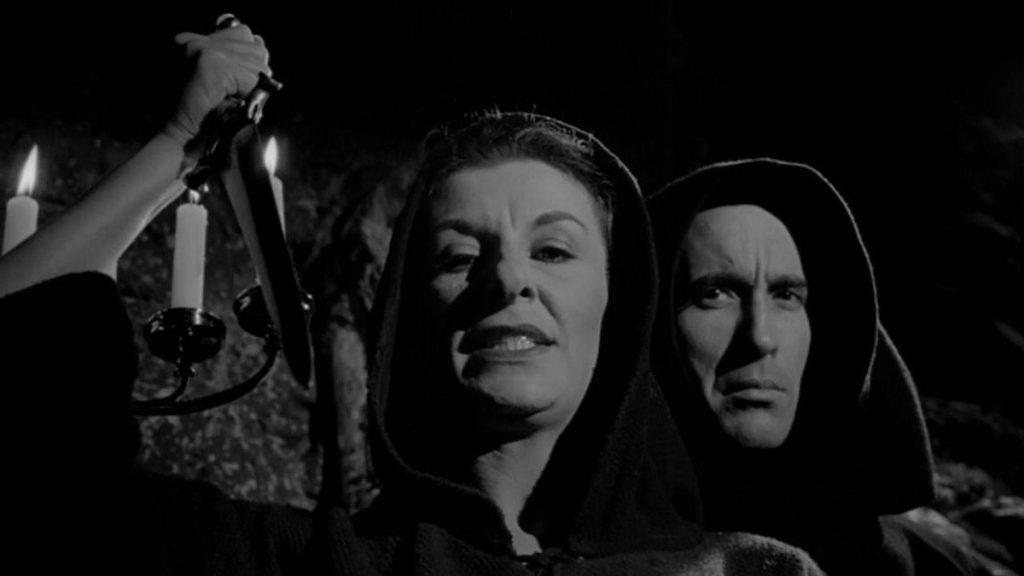
The City of the Dead AKA Horror Hotel (1960)
A key witch movie, this one features a young, lean, bird-killing Christopher Lee, bursts of Omen-style choral music, and an unexpected development that makes Psycho look rather less daring after all.
Nan Barlow (an alluring Venetia Stevenson) is an inquisitive history student determined to get a good grade on a term paper by doing some firsthand witchcraft research. She travels to Whitewood, a Massachusetts village with a history of burning witches, and checks into The Raven’s Inn.
Not the best move as it turns out.
For a start it’s next to a disused graveyard that contains the bodies of executed witches lying in unconsecrated ground. Secondly, it’s run by the cold, black-clad Mrs. Newless (Patricia Jessel), a landlady whom you can bet won’t be telling any jokes.
Asked what to do in town, Mrs. Newless replies: “I think you will find the church interesting. Unfortunately, it no longer has a congregation.”
Now there’s an understatement. It does have a reverend, though. He’s an elderly, cane-tapping blind man who couldn’t be more pessimistic about Whitewood’s predicament. For this is a Godforsaken place where ‘time stands still’.
City of the Dead is a short, briskly-paced flick with gleaming black and white photography. Whitewood’s wooden buildings, loudly ticking clocks, rudely staring locals, mysterious hooded figures, disappearing hitchers and fog-shrouded streets are convincingly conjured up and linger in the memory.
It also has a nice sense of repetition, as if events have been playing out the same way for centuries, like some kind of satanic Groundhog Day.
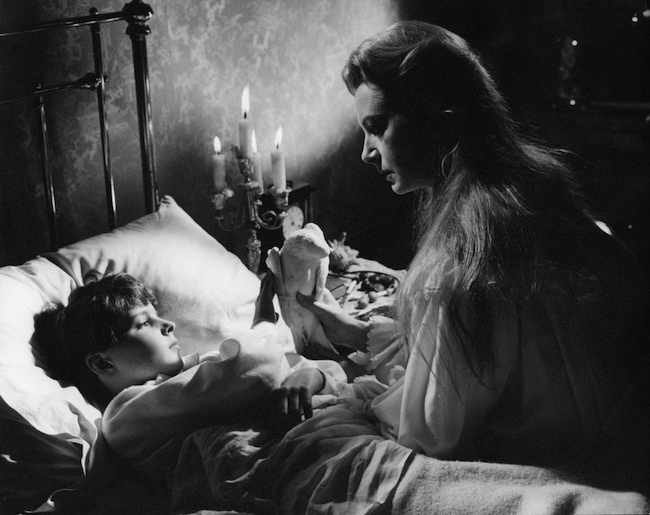
The Innocents (1961)
This is such a goddamned classy movie with its great photography and evocative atmosphere that someone as grubby and lowbrow as me shouldn’t even be allowed to watch it in the first place, let alone review it.
Deborah Kerr plays Miss Giddens, a 19th century mildly neurotic Christian governess who also happens to be ‘a damned hussy, a damned dirty-minded hag’.
Well, that seems a bit harsh, but one thing’s for sure: there’s something not quite right with the genteel picture she presents. On the surface she’s polite, sincere, and dedicated to looking after the two young children in her care at an isolated country estate. Prim and proper, I think is the phrase, but after five minutes in her company, you suspect deep down she’s gagging for it.
Bit by bit she becomes fascinated by her immediate predecessor, Miss Jessel, a woman who got tangled up in a doomed, sadomasochistic affair with another employee, Quint. Giddens demands salacious details from the kindly housekeeper, details that reveal the cruel man died in a drunken accident before the heartbroken woman drowned herself.
“There are things I’ve seen I’m ashamed to say…” the blushing housekeeper divulges. “Rooms used by daylight as though they were dark woods… I don’t know what the children saw, but they used to follow Quint and Miss Jessel, trailing behind hand in hand, whispering…”
Miss Giddens is transfixed by the sordid revelations, obviously wanting to vicariously wallow in such alien passions. She’s desperate to know how Miss Jessel was “hungry for him, hungry for his lips” as her panties start to smolder.
But surely, it’s too much to suppose the children are now possessed by the pair’s troubled spirits so they can continue their abusive sexual union?
For Miss Giddens this ‘sickness’ is one mighty puzzle, but she needs answers when it comes to the way her charges are now behaving. She might know diddly squat about hiding the sausage, but she does understand that a child under ten shouldn’t be pashing her during a bedtime kiss. Or as he chirps: “Good children can be a bit boring.”
This is a great hundred minutes of Victorian creepiness, a flick filled with billowing net curtains, foreboding candlelit wanderings along corridors, strange nocturnal animal cries, erotic dreams, distant apparitions appearing during bursts of sudden silence, and two angelic-looking children who like to watch butterflies get eaten by spiders before hurling tortoises through windows.
The children, played by Pamela Franklin and Martin Stephens, are superb, effortlessly creating the impression of telepathy amid a secretive, vaguely sinister world of play. Franklin later turned up half-naked in another haunted house flick, the brooding, well-directed but weakly written Legend of Hell House, in which the reason for the supernatural shenanigans would have to be the barmiest ever put on film.
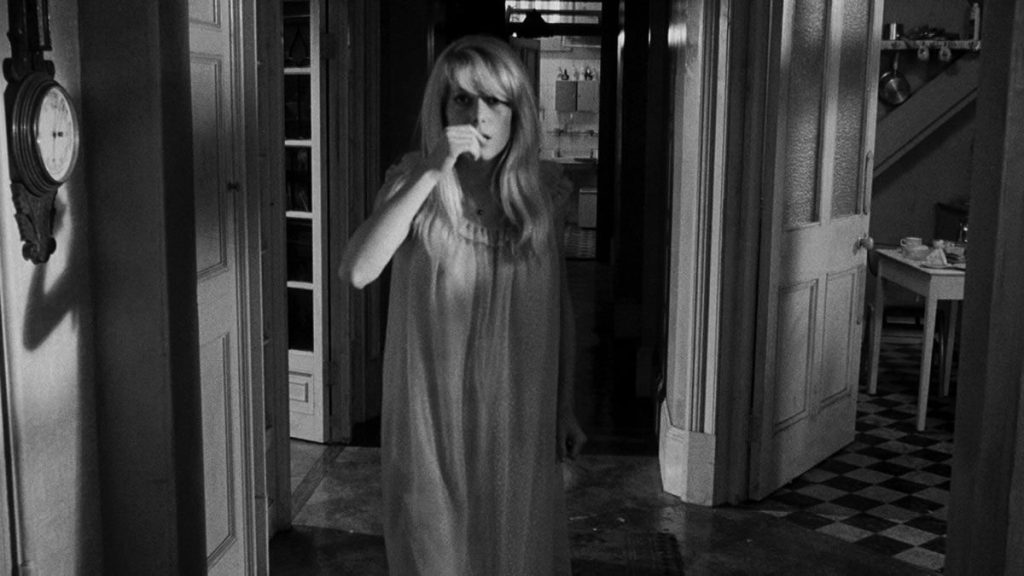
Repulsion (1965)
As you can tell from The Innocents, I find repressed female sexuality fascinating. I just love the way some women are buttoned down so tightly that one day all those stoppered but undeniable juices will start leaking, if not spurting out, in weird, unpredictable ways.
Carol Ledoux (Catherine Deneuve) is a prime example. She’s a demure Belgian beautician working in London and the whole notion of women’s lib is passing her by. She’s not standing up for her rights or burning her bra. Nor is she enjoying any newfound sexual freedoms in the swinging sixties.
In fact, just like Miss Giddens, she’s a virgin and likely to remain one for a long, long time. She’s not only withdrawn, but often in a world of her own, a world in which men are most definitely barred.
Her older sister Helen (Yvonne Furneaux), however, is a lot more liberated. They share a flat, but the regular visits of Helen’s boyfriend are a bone(r) of contention. For a start, he keeps leaving his toothbrush in her glass, as if that has some sexual symbolism. Then she has to listen to their lovemaking in the next room, excited nocturnal noises that make Carol chew her hair and clench her hands.
“I don’t think Cinderella likes me,” is the mocking boyfriend’s verdict, but at least he suspects something is wrong.
Out in the street Carol fares no better. A leering, vest-clad lay about greets her with the slightly non-PC: “Hello, darling, how about a bit of the other then?” Meanwhile, a potential boyfriend is doing his best to get past her resolute defenses. He’s a nice guy, bewildered by her constant rebuffs. At one point he’s amazingly permitted a chaste kiss, but it’s an experience akin to pressing his closed lips against a mannequin. Plus, it doesn’t exactly have the desired effect on Carol as it only makes her dash into her home and furiously clean her teeth.
The message is clear: men are dirty and must be avoided.
Even at work she gets lectured about the opposite sex. In one fantastic image she’s standing at the head of a supine customer, her vision fixed on the middle-aged woman’s upside-down mouth. “There’s only one way to deal with men and that’s treat them as if you don’t give a damn about them,” the customer tells her. “There’s only one thing they want and I’ll never know why they make such a fuss about it, but they do, and the more you make them beg for it the happier they are. They’re all the same, just like children. They wanna be spanked and then given sweets.”
It’s all too much for the fragile Carol, especially when her sister takes a two-week holiday with the boyfriend and leaves her alone in the apartment. Beforehand she’d already been weirdly staring at her reflection on the kettle and brushing invisible things off her clothes, but now she sees cracks splintering the walls. Best of all is the way she hesitantly picks up her sister’s discarded, post-coital slip off the bathroom floor and starts sniffing it. She then throws up, a marvelous moment that perfectly captures her fascination and revulsion with sex. You can tell this is seriously strange behavior because any normal person would simply put their sister’s underwear on and dance around in it.
Polanski’s first great movie is a queasy, increasingly claustrophobic portrait of mental breakdown. It’s rife with brilliantly staged hallucinations and paranoia, but is also notable for its withering depiction of men. Some idiots claim Thelma and Louise is an anti-men paean, but Repulsion is a much more convincing example of misandry.
And I love it.
Every man bar one is a sexist, sleazy, abusive pig whether they’re propositioning Carol on the street, demanding sex in lieu of rent, or phoning her up to do the heavy breathing thing. Even if they’re absent, they’re still horrible. The great thing about Repulsion, though, is you don’t peg Carol for the violent type, chiefly because of her ethereal beauty and downcast eyes. There’s nothing in her behavior, language or attitude to suggest she’s capable of going to town on all those beastly men with a cut-throat razor. Deneuve is bloody tremendous and puts in a hypnotic shift in what I would label a textbook example of the Strong Female Role.
And remember: if you fancy a girl and happen to notice she’s carrying a severed rabbit’s head in her handbag, try to date her sister instead.
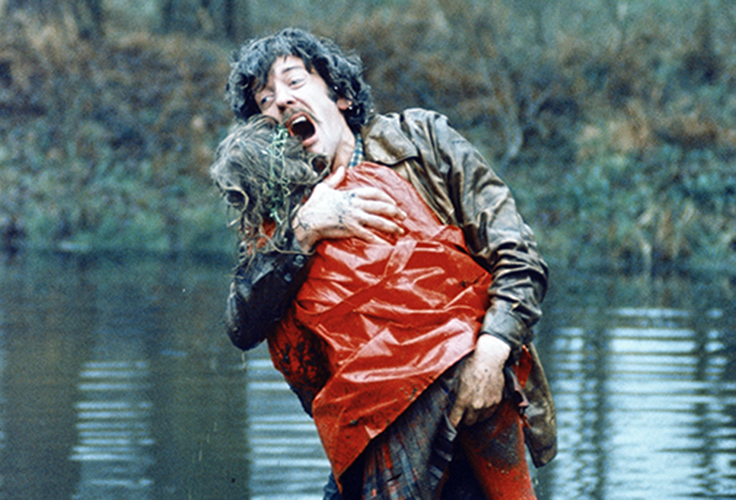
Don’t Look Now (1973)
How many horror movies have been set in Venice?
Not enough is my bet, but I doubt any have made such great use of its location as this one. It’s a wintry, shadowy place filled with crumbling brickwork, swimming rats, rust-stained balconies, labyrinthine alleyways, tolling church bells, flocks of fluttering pigeons, and of course, a diminutive, red-clad, scurrying figure.
Or as a blind psychic tells the grieving John Baxter (Donald Sutherland): “It’s like a city in aspic left over from a dinner party and all the guests are dead and gone.”
Now psychics happen to be one of my pet hates. They’re revolting, bullshit-pedaling attention seekers, but I’ve no problem with them spouting their spooky bullshit in moviedom. Here we get one telling John’s wife Laura (a ravishing Julie Christie) that she can see their ‘happy’ daughter sitting right next to them, even though the poor little tyke has already drowned in a pond back in England.
There’s more, though. The skeptical John needs to get out of the Italian city. Bad shit is coming. But he’s obstinate, telling Laura: “My daughter is dead. She does not come peeping with messages back from behind the fucking grave.”
With its premonitions, near-death experiences, and emphasis on water and the color red, Don’t Look Now has a strange, cumulative power that rewards repeated viewings.
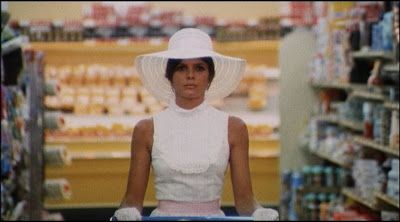
The Stepford Wives (1975)
I know it’s odd, but sometimes I get the impression I’m supposed to condemn this flick’s serene goings on.
But why would anyone tut-tut that pan-scrubbing haven, Stepford? Men and women get on famously. There’s neither domestic abuse nor even the slightest hint of an argument. It’s just relentless pleasantness and fantastic sex. When that disruptive newcomer Joanna Eberhart (Katharine Ross) tries to get the resident ladies to focus on stuff other than shopping, keeping their houses spotless and pleasing their men folk, one replies: “I’m sorry to disappoint you, but I’m happy.”
Stepford, you see, is a byword for harmony. The fact this harmony is built on murder and robotic doppelgangers just strikes me as nitpicking. I’d move there in a shot.
The Stepford Wives is based on Ira Levin’s readable, but very short novel. It repeats his Rosemary’s Baby trick of having a lone woman threatened by a sinister group after being betrayed by a weak, corrupt man who supposedly loves her. To be honest, although I enjoyed it, the book’s details are so understated that it feels like a sketch. The movie improves things because it takes Levin’s brilliantly subversive idea (cooked up during the height of feminism) and fleshes it out in a much more satisfying manner.
Still, its first half doesn’t offer a lot to creep Joanna (or the viewer) out. It’s just her womanly intuition has started to growl in the pit of her lovely, taut stomach. When she attends a lawn party and looks at the gorgeous surroundings and sumptuous display of food, she says: “I like it. It’s perfect. How could you not like it? I just don’t like it. Does that make any sense?”
Matters aren’t helped by contact with the quietly unsettling members of Stepford’s Men’s Association. Or as one tells her while she fills the kettle: “I like to watch women do the little domestic chores.”
The worrying signs feeding her paranoia keep building and it’s great how a clean kitchen or a bulldozed tennis court can speak volumes about the looming threat to her identity, her very existence. “I just know something’s wrong and my time is coming,” she blurts out to a shrink.
Will Joanna survive? This is a slow-burning pic that eventually gets where it wants to go. To be sure, the final twenty minutes take place on a stormy night and offer a delightfully creepy soak.
Fantastic coda, too.
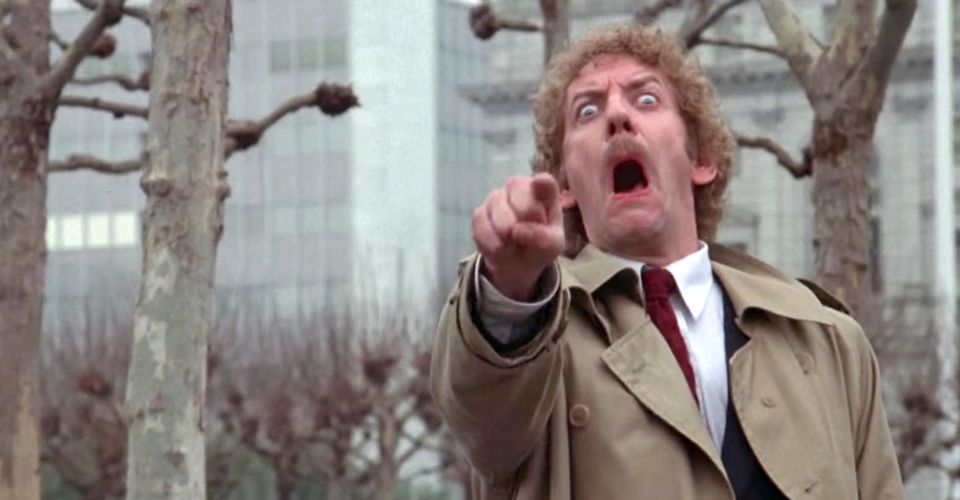
Invasion of the Body Snatchers (1978)
1978 proved a bumper year for creepy shit with the likes of Coma and Long Weekend. The creepiest of the lot, though, was Philip Kaufman’s bloody brilliant sci-fi remake of the 50s classic… Oh boy, I love this one.
It’s a movie in which a sinister vibe is often generated by the simplest things like a face pressed against a window, an office cleaner polishing the floor, or the mere act of falling asleep in a favorite outdoor chair. One by one San Francisco’s residents are catching ‘hallucinatory flu’, resulting in loved ones becoming automatons. They’re recognizable, all right, yet unrecognizable. The complaints and growing unease run along the lines of “Geoffrey is not Geoffrey” and “That not my wife.” Suddenly it’s a city full of secretive gestures, meaningful eye contact, clandestine meetings with strangers, and mysterious pods. Life’s become so weird it’s even got a cameo from Robert Duvall as a silent, staring priest not having any fun at all on a child’s swing. And we haven’t even got to the bit where a dog with a man’s head is running around.
Donald Sutherland plays a none too popular public health inspector, which seems fair enough given his double crime of tash and perm. He’s half in love with the delectable Brooke Adams, who tells him: “I keep seeing these people all recognizing each other. Something is passing between them all, something secret.” Slowly the two of them begin to grasp what’s going on, determined to resist ending up in the back of a garbage truck before being ‘born again into an untroubled world’ free of anxiety, fear, hate and anything resembling humanity.
Kaufman sets up his camera so that he seems to be surreptitiously watching events, if not spying on people. Then there’s his fondness for distorted reflections or seeing things from behind a shattered windscreen. Something’s not quite right with the pictures he’s showing us, as if they’ve gone rotten underneath. It’s fantastic stuff, and he holds his nerve right through to the brilliant ending.

The Sixth Sense (1999)
What to make of M. Night Shyamalan?
He’s the modern day Tobe Hooper, a man who came up with an iconic, monstrously successful flick early on before spending the rest of his career exemplifying the law of diminishing returns. And, of course, I’ll retract that assessment of Hooper if the lingering suspicion that Spielberg actually directed Poltergeist ever goes away.
But Mr. Shyamalan?
Despite his powerful imagination, he can’t buy a good movie for love nor money. Still, as I’ve always said, I don’t care if the bulk of an artist’s work is below par or hopeless. Why focus on the negative if someone has given you one great thing? Celebrate its existence, I say, and be grateful for that artist’s birth. You can scoff at The Happening’s plant-based lunacy all you like, but The Sixth Sense remains a sublime achievement and it’s hard to see Shyamalan ever topping it.
For a start (and you may have forgotten this) but Bruce Willis used to be a Genuine Movie Star. He’s superb here, giving an understated, quip-free, and deeply melancholy performance that’s devoid of smirking sarcasm and macho bullshit. Indeed, his only Brucey moment arrives when he mutters (unheard) to a potential love rival: “Keep moving, cheese dick.”
Aah, poor Bruce. Perhaps (like me) he lost all his powers when he lost his hair.
Anyway, Sixth Sense is a marvelously clever flick, much more so than its forerunners that include the initially decent Dead and Buried (1981), the admirably creepy Carnival of Souls (1962) and the terrific Twilight Zone episode An Occurrence at Owl Creek Bridge.
Shyamalan’s re-tweak centers on Cole Sear (Haley Joel Osment), a nine-year-old boy who can see dead people. Apart from rendering him regularly terrified, this unnerving ability is also undermining his relationships, especially the one with his doting mum (Toni Collette). The last thing he wants is for her to regard him as a ‘freak’, but that’s tricky when he draws pictures of people getting stabbed in the neck with a screwdriver. Then there’s school in which a teacher’s most innocuous question can lead to the little rascal scaring everyone by talking about mass hangings.
This is a movie about loss and the acceptance of that loss. “Sometimes people think they lose things,” Cole says, “but they just get moved.” There’s an autumnal mood throughout, punctuated by some nicely judged shocks. Mainly though, Shyamalan adopts a subtle approach through his use of moving shadows, a disappearing palm print, a reflection in a polished doorknob, a thermometer showing the temperature falling, clothes pegs that snap open by themselves, and some strange Omen-style marks on a bunch of photos. It’s a triumph of sustained eeriness. Or as Cole says: “You ever feel the prickly things on the back of your neck?”
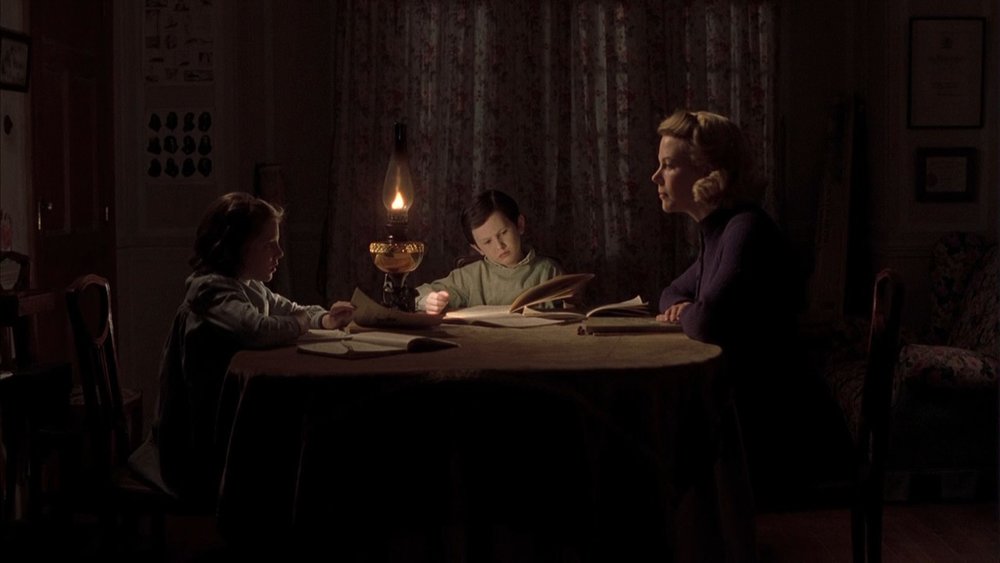
The Others (2001)
Showing there’s still spooky life in the old haunted house cliches, The Others is an intelligently written, smartly acted horror flick that also has the decency to show Catholicism’s an excellent method for filling children’s heads with poisonous shit.
I’m not much of a Nicole Kidman fan and can’t think of any movie I want to see less than that Oscar-winning one where she dons the big nose, but I wouldn’t deny her talent here. Pale, willowy and neurotic, she gives the impression of always being a few heartbeats away from a controlling outburst or full-blown hysteria. You know she loves her kids, but you can also tell it’s a fucked-up kind of obsession.
“My children sometimes have strange ideas,” she tells her new housekeeper in 1945 Jersey, “but you mustn’t pay any attention to them.”
Hmm, we’ll see…
Set almost entirely within a gothic mansion, The Others creates a world of darkened corners, mute servants, foreboding dialogue, self-playing pianos, mocking whispers, slamming doors, overhead footsteps on hardwood floors, and misty, leaf-covered grounds that contain gnarled trees and a small, private cemetery. It’s the sort of isolated, uncanny place where a long-missing husband can emerge out of the fog clutching his army kitbag.
The new housekeeper is obviously kind and patient, enduring her employer’s brittle, unpredictable behavior with barely a murmur of protest. However, she also appears to be trying to pass on something profound. “I think that sometimes the world of the dead gets mixed up with the world of the living,” she says.
The Others is like The Sixth Sense in many regards, especially the way it also boasts excellent child performances. If you want to be picky about both flicks, you could argue they spell things out too clearly, but that’s probably being a bit harsh, and I find them highly rewatchable. I like how The Others is infused with religious babble, photos of the dead, intense yearning, the pain of loss, echoes of a recently finished war, the lingering threat of disease, and a hell-bent refusal to cede territory.
Maybe one day I’ll get to see it with granddad.